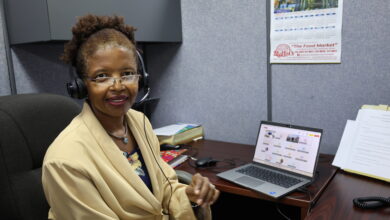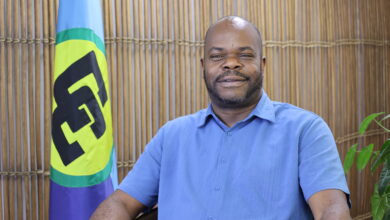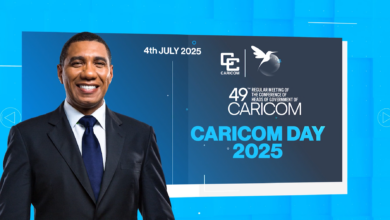Distinguished Heads of States and Governments,
Excellencies,
Ladies and gentlemen,
All protocol observed.
It is my privilege to join you for CARICOM’s 50th anniversary. Anticipating tomorrow, happy birthday CARICOM!
Prime Minister Rowley: thank you for your warm welcome.
Excellencies,
I am coming here from Haiti.
The security situation is appalling, humanitarian needs are soaring, and there is not yet the political solution in sight. But I came with hope and optimism.
It is impossible to look at the crisis without seeing the long shadow of centuries of colonial exploitation, extortion, dictatorship and other screaming injustices.
We must help ease the suffering of the Haitian people.
I want to remind that our humanitarian appeal is only funded at 23 per cent. It is a tragedy within a tragedy.
I want to recognize the critical efforts of CARICOM leaders to extend your good offices, the meeting in Jamaica and the three high-level personalities involved.
I will continue to push for a robust international security force – authorized by the Security Council – to be able to help to help the Haitian national police to defeat and dismantle the gangs, and I reiterate my call to all partners to increase support for the national police in the form of financing, training, and equipment.
Let’s be clear: There can be no lasting security without strengthened democratic institutions – and there can be no strong democratic institutions without a drastic improvement in the security situation.
Excellencies,
The challenges we see in Haiti require greater engagement and greater solidarity.
That is precisely the founding spirit of CARICOM.
You have advanced cooperation on every front – from economic and social development … to fighting illegal drugs and arms trafficking… to combatting non-communicable diseases … to advancing gender equality.
And, of course, you have championed climate action and focused attention on the plight of Small Island Developing States.
The United Nations relies on Caribbean expertise and leadership.
I don’t have to look very far for that wisdom.
It starts in the office next to mine, with my Chef de Cabinet, former Permanent Representative of Jamaica to the United Nations, Courtenay Rattray.
And I look forward to working closely with Trinidad and Tobago’s own – Ambassador Dennis Francis – as the next President of the General Assembly.
Excellencies,
This anniversary is a time for critical reflection on the enormous challenges confronting the Caribbean.
COVID-19 destroyed lives and livelihoods, independently of a more extraordinary response.
Tourism and export receipts temporarily collapsed.
Prices for fuel and food skyrocketed.
Debt burdens grew heavier, liquidity dried up, and access to global capital markets worsened dramatically.
All the while, the climate emergency continues to escalate – threatening the very existence of small island and low-lying coastal states.
We need action on two fronts:
First, action to fix finance.
Today’s crisis has revealed an international financial system that is outdated, dysfunctional, and unfair.
As part of our preparation for the Summit of the Future, I put forward a detailed blueprint for a redesigned global financial architecture, including the Bretton Woods system.
But change will not happen overnight.
And Caribbean leaders have been pointing the way forward – including Prime Minister Mia Mottley through the Bridgetown Initiative and Prime Minister Andrew Holness through the Finance for Development initiative.
I have proposed a set of actions world leaders can take now.
They include:
An SDG Stimulus for investments in sustainable development, climate action, and more.
An enhanced and effective debt relief mechanism.
New financial tools, such as swaps that convert debts into investments in climate adaptation.
An increase in the capital base of Multilateral Development Banks and a change in their business model with a new approach to risk to be able to leverage more private finance at a reasonable cost in support of developing countries.
The re-channelling of Special Drawing Rights.
And a shift in subsidies – away from fossil fuels and unsustainable agriculture and food systems into sustainable development.
And redressing a core injustice facing middle-income countries: the continued lack of access to concessional financing because of allocation metrics that ignore vulnerabilities to shocks such as financial crises or climate-related disasters.
I fully support your call for a Multidimensional Vulnerability Index.
Excellencies,
That leads me to the second area for action – the climate crisis.
Limiting the rise in global temperature to 1.5 degrees Celsius is still possible.
But it will require carbon emissions to be cut by 45 per cent by 2030.
That is why I have proposed a Climate Solidarity Pact – in which all big emitters make extra efforts to cut emissions; and wealthier countries support emerging economies to do so.
And that is why I have put forward an Acceleration Agenda to boost these efforts.
I urge Governments to hit fast forward on their net-zero deadlines so that developed countries commit to reaching net-zero as close as possible to 2040 and emerging economies as close as possible to 2050, and Caribbean countries have been showing the way.
Developed countries must also finally make good on their financial commitments to developing countries – including by meeting the $100 billion goal, doubling adaptation finance, replenishing the Green Climate Fund, and operationalizing the loss and damage fund this year.
I thank Caribbean leaders for your powerful calls for climate justice, advancing global action on loss and damage, investing in renewables, and safeguarding biodiversity, including through the efforts of Indigenous communities.
Excellencies,
In his iconic song Rally Round the West Indies, the great calypsonian David Rudder said: “soon we must take a side or be lost in the rubble, in a divided world that don’t need islands no more.”
My message is clear: our world needs the islands.
We need to rally round CARICOM.
You have my full support.
And I thank you.






